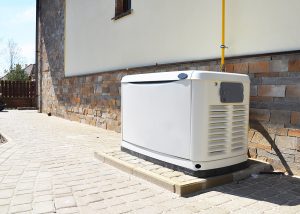How to Choose the Right Size Generator for Your Home
You’re done being frustrated by frequent power outages, and you’re ready for a generator. Now it’s time to choose which generator. Many homeowners start their research by looking for the most popular brands, but it’s usually the size that makes the biggest difference in how well your generator will function. When choosing the size of your generator, don’t just guess. Take the time to really look at your energy needs so you can make an accurate estimation of what you’ll need, and then look to a trusted electrician to guide you from there.

Calculate Your Energy Needs
How do you determine the amount of power you need for your generator? The size of the generator you need depends on what you need to power and how much power those appliances require. Start by making a list of the appliances you want to power. Many homeowners go room by room. In the kitchen, you likely want to run your refrigerator, stove, and some small appliances, like your coffeepot, air fryer, toaster, or slow cooker. Some homeowners think that if they’re installing a home generator, it should be able to power everything, including the dishwasher and microwave. In the basement, you should include your water heater, sump pump, dehumidifier, and HVAC system. In the main living areas, consider the TV, lights, and ceiling fans. Make sure to think about plugging in your phone, laptop, tablets, and anything else you use.
Once you have a thorough list of appliances, start adding their wattage. A refrigerator needs 700 watts to run, a TV needs about 150, a dishwasher needs 1500, a sump pump needs about 900, and so on. You can find most of these wattages on your appliance itself, in the manual, or by searching online. A large portable generator can power up to 7500 watts, whereas a whole home standby generator can handle 20,000 watts, and even beyond. If you are willing to reduce your usage during an outage, you may be able to get away with a smaller generator. However, if you think you may need to weather several days of an outage after a severe storm, you may want to consider a larger generator.
How Often Will You Use It?
Is your area prone to severe weather on the hottest days of summer or the coldest of winter? Have you already experienced long outages after a hurricane, blizzard, or other storm and found that a few hours is all you can handle? A smaller generator can get you through the occasional outage, getting you just enough power to minimize your annoyance. But if blizzard winds or hurricane gales are bringing down trees and knocking you out for days, you will want the heating and cooling capabilities that a bigger capacity generator can provide. A window AC uses 1000 watts of electricity, and a space heater uses 1500 watts. With a smaller capacity generator, you may be using up most of the capacity of keeping your family comfortable. Once a year? You might be able to handle it. If you experience more frequent or longer outages, a larger capacity makes more sense.
Portable or Standby?
A small inverter, which is a very portable generator, provides up to 2000 watts of power. This type of generator can be carried with you (they weigh only about 60 lb) and are often used while camping or tailgating, providing enough power for a fridge, a TV, and a small cooktop. You can charge your phone, tablet, and laptop, and keep a few lamps lit and some small appliances working. Larger “portable” generators aren’t quite as easy to tote, but can be stored in a garage or shed and pulled out before severe weather. For a few gallons of gas and an easy-to-install transfer switch, you can keep the lights on and the fridge running for about a day.
A home standby generator will be permanently installed next to your house and wired to automatically kick on during a power outage, allowing your home to operate just as you would normally. Because they’re permanently installed, they can be hooked up to a natural gas or propane line, eliminating the need to store gasoline.
Always Get the Professionals Involved
Whether you are installing a transfer switch for a portable generator or a permanent standby generator, it is always advisable to defer to the professionals when it comes to electricity. Generators – when installed and operated correctly – are very safe, but a licensed electrician should always perform any electrical work.
In addition, once you have all the information about the appliances you need to power and your wattage needs, an electrician can help advise you on the best option for your home. Many electricians have certain brands that they know are trustworthy, reliable, and durable. They can help you cut through the marketing lingo to find the perfect generator for you, and then make sure that generator is installed correctly.
If you are tired of frequent storms keeping you in the dark, it’s time to invest in a generator that can keep your family safe and comfortable. Look for a trusted electrician who can help you find the features that matter most and the size that is perfect for your family. When you look to the professionals, you know that your family’s comfort and safety will be the top priority.
Ready to find the right generator for your home? Let the professionals at Oakwood Electric & Generator help you choose and install the perfect fit—safely, efficiently, and with your family’s comfort in mind. Contact us today to learn more.